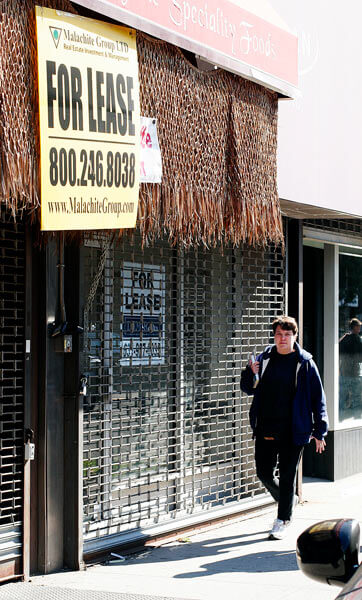By Joe Anuta
Empty storefronts dot the commercial strips in Ridgewood and Forest Hills, but the reasons behind the vacancies are different for each area, according to business leaders in both neighborhoods.
Vacancy in the Ridgewood shopping strip is between 5 percent and 6 percent, which is high, according to Ted Renz, executive director of the Myrtle Avenue Business Improvement District.
Renz spoke along with a panel at a Queens Civic Congress meeting last month focused on small business in the borough.
“A lot of it has to do with the economy,” he said. “But some of the landlords at this point are not willing to come down in their rent.”
Some landlords in the area should take the initiative to get businesses into vacant stores, he said.
Potential tenants have complained to Renz that they have been priced out of certain retail locations.
One possibility is that some of the landlords bought properties when the values were high and are now suffering due to the recession, Renz said.
But some of the properties along Myrtle Avenue have sat vacant for years.
“You would think that some rent is better than no rent,” Renz said in a subsequent interview. “Sometimes if an owner has a lot of properties, it doesn’t mean anything to them.”
But there are also good landlords who foster business growth in the community as well, he said.
As an example, Renz said that Laurence Levy of Leavy Properties has been making positive changes and renovations in some of his properties.
Renz said that a weak retail climate is another possible factor to the vacancies along the avenue.
“A lot of retailers aren’t expanding. They just aren’t doing it right now because of the uncertainty,” he said.
Over in Forest Hills, the vacancy problem is not as pronounced and store owners face different challenges, according to Leslie Brown, president of the Forest Hills Chamber of Commerce.
“I think that Austin Street demands a high rent per square foot, and I think the economy is a little bit tough right now,” she said.
For instance, a small shop offering small, low-priced items will have to sell more of them in a given day to make rent.
For some stores that do not have a lot of square footage to display their products, it is just not feasible.
“If your product isn’t doing that, you haven’t done your homework and it’s not the landlord,” she said.
As an example of success, she cited La Boulangerie, at 109-01 72nd Road. The owners have a large enough inventory to sustain their expenses.
“It’s a huge place and it’s doing great,” she said.
She said property owners like Cord Meyer are sensitive to small business needs, but there is still one landlord on the avenue who might not be coming down in price and has partitioned a storefront into smaller spaces, where it is harder to have enough product.
Reach reporter Joe Anuta by e-mail at januta@cnglocal.com or by phone at 718-260-4566.



































